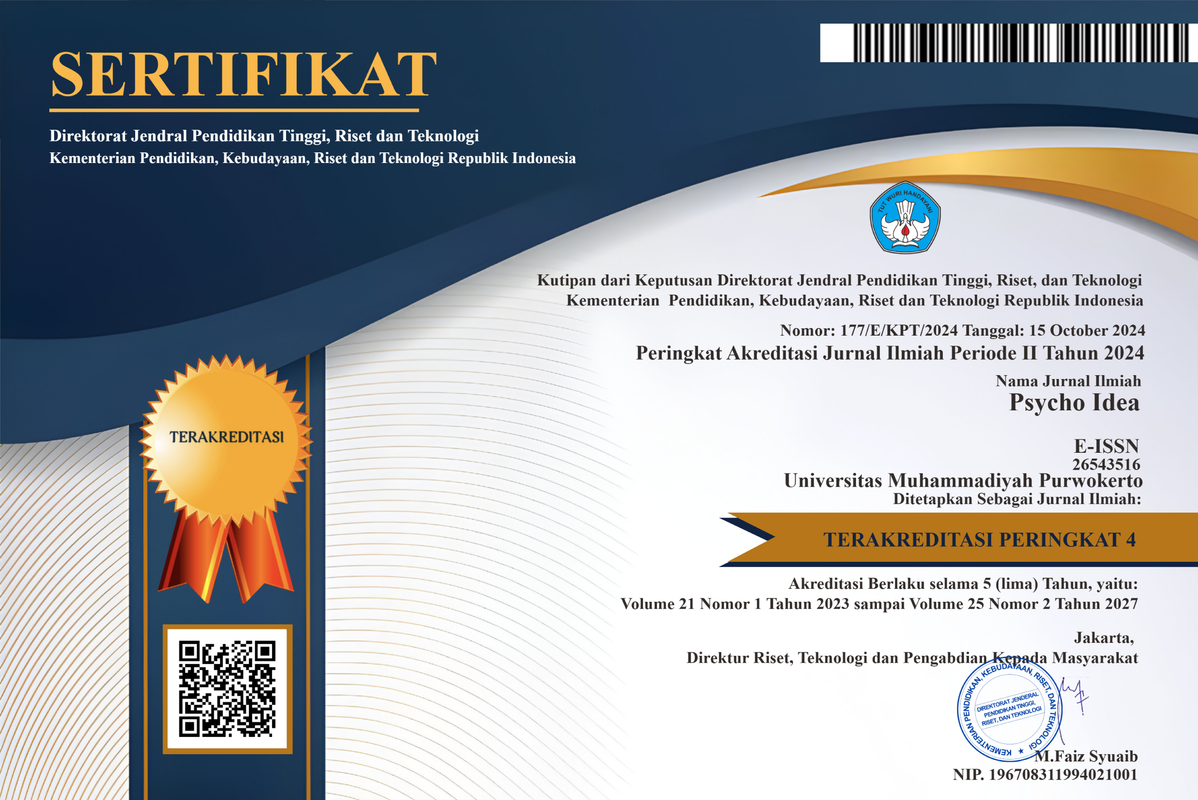PELATIHAN MANAJEMEN DIRI UNTUK MENURUNKAN KADAR GULA DARAH PADA PENDERITA DIABETES MELITUS TIPE II
DOI:
https://doi.org/10.30595/psychoidea.v8i2.235Abstract
Penelitian ini bertujuan untuk mengetahui apakah pelatihan manajemen diri dapat menurunkan kadar gula darah pada penderita diabetes melitus tipe II. Hipotesis penelitian ini adalah ada perbedaan tingkat kadar gula darah antara pretest dan post test. Kadar gula darah lebih rendah pada saat post test. Subjek penelitian sebanyak 3 orang. Penelitian ini menggunakan metode quasi experimental design dan rancangan eksperimen the one group pretest-posttest design. Hasil analisis berdasarkan pemeriksaan visual (visual inspection) yaitu dengan penyajian secara grafik menunjukkan tidak terjadi penurunan kadar gula darah sesudah pelatihan manajemen diri. Namun, pada saat pelatihan manajemen diri terlihat penurunan kadar gula darah menjadi kurang dari 200 mg/dl Kata kunci : kadar gula darah, pelatihan manajemen diri, penderita diabetes melitus tipe IIReferences
Bandura, A. (2005). The Primacy of self regulation in health promotion. International Association for Applied Psychology. 54 (2), 245-254
Bandura, A. (2004). Health promotion by social cognitive means. Health Education & Behavior. Vol.31 (2):143-164
Bandura, A. (1994). Self eficacy. Dalam V.S. Ramachaudran (Ed). Encyclopedia of Human Behavior (vol.4. pp.71-81). New york : Academic Press (Dicetak ulang dalam H.Friedman [Ed]. 1998. Encyclopedia of Mental Health. San Diego : academic Presss.)
Beck, M.E. (2000). Ilmu Gizi & Diet : Hubungan dengan Penyakit-Penyakit untuk Perawat & Dokter. Andry Hartono & Kristiani (pen). Yogyakarta : Yayasan Essential Medica
Delamater, A.L. (2006). Improving adherence. Clinical Diabetes. Alexandria:Spring, 24 (2), 71-75
Frayne, C.A. (1991). Reducing Employee Absenteeism through Self-Management Training: A Research-Based Analysis and Guide. New York : Quorum Books
Frayne, C.A & Geringer, J.M. (1992). Self management training for joint venture general managers. Human Resource Planning, 15(4), 69-84
Gibson, S.K. (2004). Social learning (cognitive) theory and implication for human resource development. Advances in Developing Human Resources. Vol.6 No. 2 : 193-210
Hergenhahn, B.R & Olson, M.H, (2008). Theories of Learning (Teori Belajar). Tri Wibowo B.S (Alih bahasa). Jakarta : Kencana Prenada Media Group.
Kanfer, F.H. (1984). Self management methods, dalam Helping People Change. Kanfer, F.H & Goldstein, A.P. (ed). New York : Pergarmon Press Inc
Konsensus Diabetes Melitus di Indonesia. 1993. Perkumpulan Endokrinologi, Pertemuan Konsensus 1993
Lathan, G.P & Frayne, C.A. (1990). Increasing job attendance through training in self management : A Review of two Field Experements. Dalam Kleinbeck, U dkk (editor). Work Motivation. Hillsdale : Lawrence Erlbaum Associates
Mangoenprasodjo, A.S. (2005). Hidup Sehat dan Normal dengan Diabetes.Yogyakarta : Thinkfresh
Moerdowo, R.W. (1989). Spektrum Diabetes Melitus. Jakarta : Djambatan
Nugroho, Septian Adi. (2010). Hubungan antara Tingkat Stres dengan kadar Gula darah pada Pasien Diabetes Melitus di Wilayah Kerja puskesmas sukoharjo Kabupaten Sukoharjo. Abstrak. Surakarta : Universitas Muhammadiyah Surakarta.
Pratikowati, Yekti. (2002). Faktor-faktor yang Berhubungan dengan Kepatuhan Pasien dalam Berdiit Kaitannya dengan Pengendalian Kadar Gula Darah pada Penderita Diabetes Melitus di RSUD Dr Moewardi Surakarta. Abstrak. Surakarta : Universitas Muhammadiyah Surakarta.
Rinto, NA., Sunarto., Fidianingsih., 2008. Hubungan Antara Sikap, Perilaku dan Partisipasi Keluarga Terhadap Kadar Gula Darah Penderita Diabetes Melitus Tipe 2 di RS PKU Muhammadiyah Yogyakarta Bulan Januari-Juli 2008. Abstrak. Yogyakarta : Fakultas Kedokteran Universitas Islam Indonesia.
Sarafino, E.P. (1990). Health Psychology : Biopsychosocial Interaction (3ed). New York : John Wiley & Sons. Inc
Senecal, C., Nouwen, A., White, D. (2000). Motivation and diatary self care in adult with diabetes: are self efficacy and autonomous self regulation complementary or competing construct. Health Psychology. 19,5,452-457
Sibuea, W.H., Soedjodibroto. W., Ndraha. S. (1997). Perencanaan Makan bagi Penderita Diabetes Melitus dengan Sistem Unit. Jakarta: CV. Infomedika
Soegondo, S., Soewondo, P., Subekti, I., Widyahening, I.S., Paramita, H (Ed). (1999). Penatalaksanaan Diabetes Melitus Terpadu : Sebagai Panduan Penatalaksanaan Diabetes Melitus Bagi Dokter Maupun Edukator. Jakarta : CV. Aksara Buana & Pusat Diabetes dan Lipid RSUP Nasional Dr. Cipto Mangunkusumo Fakultas Kedokteran Universitas Indonesia.
Sukardji, K.(1999). Penatalaksanaan Gizi pada Diabetes Melitus, dalam Soegondo, S., Soewondo, P., Subekti, I., Widyahening, I.S., Paramita, H (Ed). Penatalaksanaan Diabetes Melitus Terpadu : Sebagai Panduan Penatalaksanaan Diabetes Melitus Bagi Dokter Maupun Edukator. Jakarta : CV. Aksara Buana & Pusat Diabetes dan Lipid RSUP Nasional Dr. Cipto Mangunkusumo Fakultas Kedokteran Universitas Indonesia.
Susanto, A. (2005). Hadapi Diabetes dengan Senyum. Senior. Hlm 4
Suyono, S. (1999). Kecenderungan peningkatan jumlah pasien diabetes, dalam Soegondo, S., Soewondo, P., Subekti, I., Widyahening, I.S., Paramita, H (Ed). Penatalaksanaan Diabetes Melitus Terpadu : Sebagai Panduan Penatalaksanaan Diabetes Melitus Bagi Dokter Maupun Edukator. Jakarta : CV. Aksara Buana & Pusat Diabetes dan Lipid RSUP Nasional Dr. Cipto Mangunkusumo Fakultas Kedokteran Universitas Indonesia.
Taylor, S.E. (1995). Health Psychology. New York : McGraw Hill Inc
World Health Organization. (2003). Adherence to Long Term Therapies Evidence for Action. Switzerland : Eduardo Sabate-WHO
Downloads
Published
Issue
Section
License
Authors published in this journal agree to the following terms:
- The copyright of each article is retained by the author (s) without restrictions
- The journal allows the author(s) to retain publishing rights without restrictions
- The author grants the journal the first publication rights with the work simultaneously licensed under the Creative Commons Attribution License, allowing others to share the work with an acknowledgment of authorship and the initial publication in this journal.
- Authors may enter into separate additional contractual agreements for the non-exclusive distribution of published journal versions of the work (for example, posting them to institutional repositories or publishing them in a book), with acknowledgment of their initial publication in this journal
- Authors are permitted and encouraged to post their work online (For example in the Institutional Repository or on their website) before and during the submission process, as this can lead to productive exchanges, as well as earlier and larger citations of published work
- Articles and all related material published are distributed under a Creative Commons Attribution-4.0 International Public License (CC - BY 4.0).
License
Psycho Idea is licensed under a Creative Commons Attribution- 4.0 International Public License (CC - BY 4.0).
You are free to :
Share — copy and redistribute the material in any medium or format
Adapt — remix, transform, and build upon the material for any purpose, even commercially











